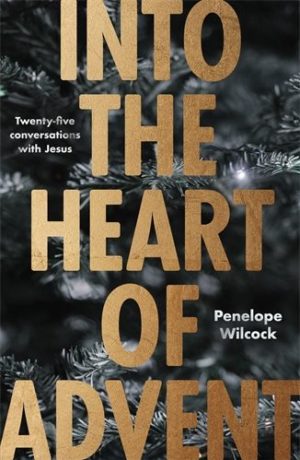



Add to your altar a crown — you can have fun making one from painted card (with added glitter!) or a napkin ring to represent a crown, or a picture taken from the internet — and a note saying: “Every time I exercise my judgement in what I think, say or do, help me to remember I am your ambassador in the world and a citizen of the heavenly kingdom”.
In her book Into the Heart of Advent, Penelope Wilcock takes us on a journey through the themes of Advent by a series of imagined conversations with Jesus.
During the Advent season, at the same time as everyone is getting ready for Christmas, preparing to celebrate with turkey (or nut roast) and Christmas pudding, buying gifts and cards for family and friends, decorating their homes with lights and tinsel, the Church asks us to focus on the second coming of Jesus as judge and king.
Sometimes these two emerging themes sit alongside each other uncomfortably, ending up with the Church denigrating the people for their joyous preparations when they ‘should have been’ thinking about end times instead, and then asking them to start thinking about Christmas for twelve days starting with the 25th December.
More realistic is a wise blending and balancing of the two — Christ’s coming to us in humility as the newborn baby laid in the manger, and his coming again in judgement. If we put them together, it helps us keep love and judgement in the same place.
When we think about the judgement of God, we can probe into it more usefully if we explore the priorities of God emerging from the Scriptures. The Law and the Prophets unite in an emphasis on social justice and reverence for the holy. The prophet Amos (like the other prophets) makes a clear distinction between a holy life expressed in justice, mercy, kindness and care for the vulnerable, and the empty religiosity of people who profess a faith but oppress the poor:
I hate, I despise your feasts,
Amos 5:21-24 RSV (the Lord speaks)
and I take no delight in your solemn assemblies.
Even though you offer me your burnt offerings and cereal offerings,
I will not accept them,
and the peace offerings of your fatted beasts
I will not look upon.
Take away from me the noise of your songs;
to the melody of your harps I will not listen.
But let justice roll down like waters,
and righteousness like an everflowing stream.
Jesus homes in on this problem of religious hypocrisy in his own teaching. The Day of Judgement is often referred to as “that day” in the Bible, and here is what Jesus has to say about it:
Not every one who says to me, ‘Lord, Lord,’ shall enter the kingdom of heaven, but he who does the will of my Father who is in heaven. On that day many will say to me, ‘Lord, Lord, did we not prophesy in your name, and cast out demons in your name, and do many mighty works in your name?’ And then will I declare to them, ‘I never knew you; depart from me, you evildoers.’
Matthew 7:21-23 RSV
So judgement is about making truth appear, as well as weighing words and deeds in the balance to establish their value; and what pleases God is the life characterised by reverence, justice and mercy.
In the modern world, we see again and again how the themes of Incarnation and Judgement blend and interweave, as we establish social, political and religious principle.
As 2020 has unfolded with all its turbulence, we in the UK have seen a government making pronouncements about the imperative of keeping the law — while breaking it themselves. We have watched and listened as the searing injustices of racism played out before our eyes in the murder of George Floyd (and so many others), the abandonment and deportation of refugees whose countries we bombed, the Windrush scandal, and widespread evidence of systemic racism. We have noted the media silence on the trial of Julian Assange, learned that London is the corrupt heart of the laundering of dirty money globally, and we have watched as those entrusted to lead our country diverted for their own purposes billions of pounds of public money that should have financed a robust response to the pandemic. Violence, greed, corruption, betrayal, have all been most prominently evident.
As Christians we understand the prophetic call to be both salt and light — the responsibility both to speak out against corruption and violence and also to live the incarnation as Christbearers in a world where people are confused and afraid, oppressed and betrayed.
During Advent we can surely blend the preparation of our hearts to meet Christ our judge with our preparations to receive him as Jesus the light of the world, the refugee baby born in uncertain times to a persecuted people under military occupation.
Into the Heart of Advent explores the theme of judgement and the cry for social justice, especially in chapters 4, 5, 7, 10 and 14 — as follows:
Ch.4, Judgement, looks at how our choices and decisions contribute towards creating the world we live in, and that the responsibility of being a disciple includes exercising our own judgement to build a better world.
Ch.5, Dominion, explores what is meant by the concept of the servant king, and how authority arises from the willingness to bear responsibility.
Ch. 7, The Prophetic Life, considers how small actions contribute towards shaping society as a whole, and notes that we are called to practice our faith not in splendid isolation but as members of a community. The prophetic life is the work of the whole people of God.
Ch. 10, Fire, speaks of the flame of the Spirit inside us, and of the baptism in Holy Spirit and fire.
Ch.14, Herod, is about the disciple’s response to corruption in high places — whether that be the moments one is called to speak truth to power, or the daily witness of a quiet and peaceable life.
Reading these chapters in advance may help your home group prepare.
Lord Jesus, you came to redeem us, to save and heal us. You came to bind up the brokenhearted and set the captive free. You showed us how to live in simplicity and humility, the servant king. You, who have done all this for us, have earned the right to be our judge. Merciful Lord, by your power and grace, transform our minds and our lives into a reflection of your glory and the image of your love. Help us to do what pleases you, to choose what is good for us, and to walk in the freedom of your gospel. We ask it for your Name’s sake. Amen.